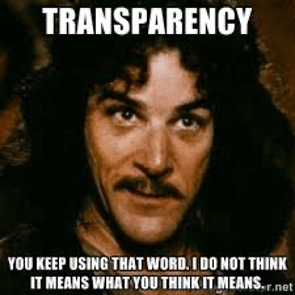Setting Expectations: How to Effectively Work with a Recruiting Firm
Author: Kristy Hawkins
Setting expectations is important to any successful relationship, both personal and professional. Arrive to any meeting prepared, be clear and engaged, ask relevant questions, and above all else, be reasonable.
Negative misconceptions can be created around an entire industry simply because a single company failed to be clear and reasonable with their expectations. Unfortunately, this has proven to be true for recruiting and staffing – great firms have been negatively impacted by factors outside of their control.
I’d like to take a moment to discuss how to effectively work with a recruiting firm and create a true partnership by setting realistic expectations for both the firm and the client company.
The below scenarios are ones I see often that separate mediocre recruiting firms who are only concerned about boosting revenue from the recruiting firms working to establish a true partnership with their clients. These scenarios often hinder the recruitment process and ultimately the goal of filling a critical role for an organization.
Scenario #1: Their turnover is high
It’s true – a recruiting firm has some influence over the turnover rate of their contract workers. But the recruiting firm’s hiring strategy is the more important factor to consider.
If a recruiting firm hires a “warm body” so they can start incurring revenue, without concern for the quality of hire for their client – that’s a problem. Yes, some recruiting firms do this as a strategy so the minimum hour clock starts over and the recruiting firm has continuous billing. Not all recruiting firms do this.
A great recruiting firm looks out for everyone’s best interests. They want their candidates to have a good job with a good company and convert to the client’s employee roster. They want their clients to be happy with their services and continue to have a partnership with them. They want to add value to the company’s recruitment process.
So, who is responsible for the turnover rate? The recruiting firm and the client.
Yes, the client is also responsible for turnover. Do you have a welcoming culture? Are the contract workers treated differently than the traditional employees? What is your onboarding process? What training do you provide? These are some of the variables that the recruiting firm isn’t in control of. If you’re only looking at a turnover metric, you’re not looking at the entire picture.
Scenario #2: Utilizing a recruiting firm is more expensive than doing it on your own
In most buying scenarios, you get what you pay for – recruiting and staffing firms are no exception. When looking for a firm to partner with, you’ll shoot yourself in the foot making a decision based on pricing alone… especially choosing the one with the lowest rate just because it’s the lowest rate.
Don’t make the mistake of seeing a recruiting firm as a “necessary evil” because of a bad experience with a mediocre firm only interested in generating revenue instead of creating a true partnership with their clients.
To clarify, I’m not saying the highest quote is indicative of the best recruiter either. I’m saying: don’t let cost be your only measure in the decision-making process. Interview the recruitment firm; ask about their process and get client references from them. Discuss expectations – what are you looking for from a recruiting partner? Let them discuss their expectations as well. Create a partnership, not just a vendor relationship.
Keep in mind: if the recruitment firm is offering contingency, they take considerable risk on the front end by working the order, with no guarantee they’ll get paid.
Scenario #3: Quality of candidates is poor
A great recruitment firm will focus on the quality of candidates they send to their clients. It’s their job to dial down and understand the type of candidates a company is seeking to employ. Some firms send poor quality candidates and don’t care… find a firm that cares.
If a client’s expectations don’t align with market availability, the firm should communicate that and find out what variables can be changed to attract talent. Will they always bat 1000%? No. But if the recruitment firm is consistent, works hard to find quality candidates, communicates openly, and is successful more often than not, you probably have a good partner.
Scenario #4: Unicorn positions
Giving a unicorn position and judging the firm based on their ability to fulfill it, isn’t reasonable. If a company has had a position open for more than 6 months, it’s time to look at why. Engaging with a recruiting firm after trying for 6 months and expecting a miracle isn’t realistic.
Does it happen? Yes. Often? No. Filling a unicorn position quickly is the exception, not the rule.
Scenario #5: Lack of communication regarding the position

If a company is only willing to share a job description and compensation for the position they need to fill, can you realistically expect a recruiting firm to be successful filling it? A great firm will ask for an intake call or meeting to discuss the role further.
On the other side, if a recruitment firm starts working on filling a role with only a job description and compensation without asking any questions – that should raise a red flag. The exception is a long-standing client with a recruiting firm already familiar with their client company and the role.
As a client, all decision makers should be involved in the intake meeting; if HR is the only one involved in communication, critical pieces of information may be missed from the process. It’s imperative the hiring manager(s) are involved with the recruitment firm – this creates a much better chance of overall success.
Scenario #6: No communication or feedback on resumes and/or interviews
No news doesn’t always equal good news… in fact, no news can cause major issues. When a firm’s client fails to provide timely feedback on a resume submitted and/or a candidate interview, both the company and the recruiting firm’s credibility stands to take a hit.
One of the biggest turn-offs for a recruiting firm and for candidates is being left hanging. Communicate your thoughts and intentions in a timely manner. If you’re still discussing the candidate, or waiting for another decision maker to have an opening in their calendar, then communicate that.
In addition, if you promise an update by a certain date/time, adhere to that promise. If you need to adjust and reschedule, then communicate that need. It’s simple: treat the recruitment firm as a partner and their candidate(s) as potential employees of your organization – both deserve respect.
Scenario #7: The guarantee should be longer
Food for thought: are you paying the recruitment firm for the candidate, or for the process of finding the right candidate?
There are variables outside of a recruitment firm’s control: a company’s environment, training period, onboarding process, final candidate choice, etc. The recruiting firm is in control of the process of sourcing, qualifying/vetting candidates to successfully match them to a client’s needs. Plain and simple.
Consider the above scenarios when you’re ready to consider working with a recruiting firm dedicated to finding the right candidates for your company. Achieving and maintaining a successful partnership involves setting realistic expectations for all involved.





